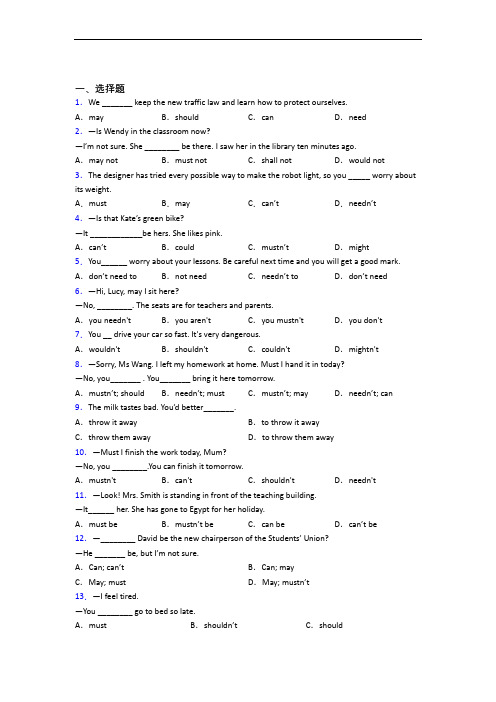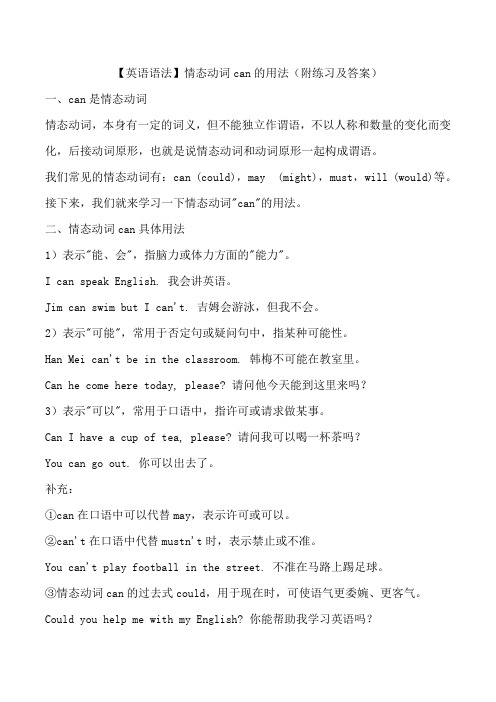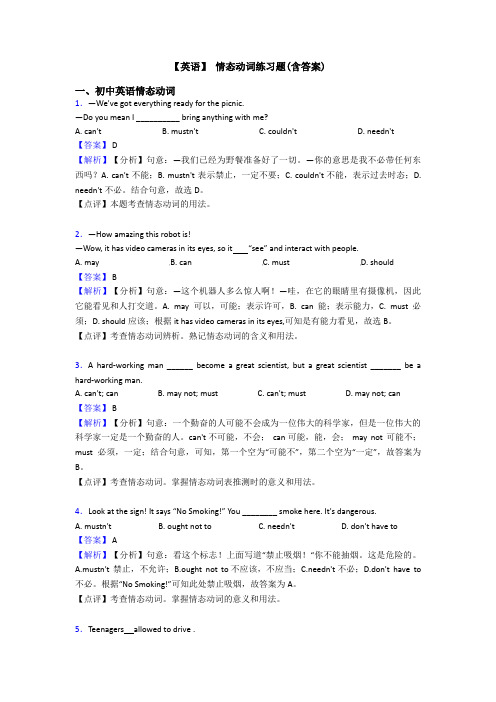初中英语代词情态动词总结及经典练习题
情态动词专题(含答案)经典

情态动词专题(含答案)经典一、初中英语情态动词1.——Do you have any plans for this summer vacation? ——I'm not sure. I ___ take a trip to Taiwan.A. mustB. needC. mayD. should【答案】C【解析】【分析】句意:一今天暑假你有什么计划吗?一我还不确定。
我可能去台湾去旅行。
A.必须,一定;B.需要,必要;C.可能;D.应该。
根据句中I'm not sure可知,说话人还没有确定的计划,所以这只是一个可能,应选C。
2.—Where is Monica? I can't find her anywhere.—She be in the library. She loves reading books when she is free.A. mustB. needC. can't【答案】 A【解析】【分析】句意:——莫妮卡在哪?我到处都找不到她。
——她肯定在图书馆,她喜欢空闲时看书。
A肯定,肯定句中表示推测,B需要,C不可能,否定句中表示推测,根据 She loves reading books when she is free ,可知是肯定句表示推测,故选A。
【点评】考查情态动词,注意情态动词表推测的用法。
3.You be tired after walking for such a long time. Sit down and have a rest.A. canB. can'tC. mustn'tD. must【答案】 D【解析】【分析】句意:走了这么长时间你一定很累了。
坐下休息一下吧。
can能,能够,can't不能,对事物进行否定推测;mustn't一定不是,禁止,must一定,对事物进行肯定推测,根据after walking for such a long time,可以肯定你一定很累,所以是进行肯定推测,情态动词使用must,故选D。
广西梧州初一上英语常用语法知识——情态动词经典练习题(培优练)

一、选择题1.Tom, laugh at(嘲笑)others. It’s not polite!A.don't B.doesn’t C.not D.don't be A解析:A【解析】【详解】句意:汤姆,别嘲笑别人。
它不礼貌!祈使句的否定形式的构成为:1、Don’t+动词原形!2、No+动名词形式!根据所给空后面的laugh是动词原形,可知,应该用don't,故答案选A。
2.Don’t ________ your glass too _______.A.fill; full B.fill; filled C.full; full D.full; filled A解析:A【解析】【分析】【详解】句意:不要把你的杯子倒得太满。
考查动词和形容词辨析。
fill填充,动词;full满的,形容词。
本句是否定祈使句,前空需用动词,full是形容词,可排除CD两项。
后句too (太)是形容词,修饰形容词或副词。
根据句意语境,可知选A。
3.______ talk in the library.A.Don’t B.Not C.Not to A解析:A【解析】【详解】句意:在图书馆不要说话。
此处是祈使句的否定形式,因此在动词原形前加don’t,故为Don’t+动词原形。
故选A。
4.Please _____ look outside. Look at the black board.A.not B.don’t C.aren’t D.can’t B解析:B【解析】【详解】句意:请不要往外面看,看黑板。
not不,副词;don’t不要;aren’t不是;can’t不能。
这是祈使句的否定形式,应用don’t,后跟动词原形。
故应选B。
5.---Be careful, don’t forget to follow your father.---I know that, Mum. One can never be too careful.A.and B.or C.but D.so A解析:A【解析】试题分析:and和,并且;or或者,否则;but但是;so因此。
初中语法:情态动词知识点练习题

初中语法:情态动词知识点练习题一、情态动词单项选择题1.—Shall I tell him the change of the time right now?—I’m afraid you ________, otherwise he will be late for the meeting.A.can B.may C.must D.need【答案】C【解析】【详解】句意:——我现在就告诉他时间改变了,好吗?——恐怕你必须这么做,否则他开会就要迟到了。
考查情态动词辨析。
can能够,表能力或许可;may可以,表推测;must必须;need需要。
根据下文“otherwise he will be late for the meeting”,可知ABD三项不合语境,这里是说必须告诉他时间改了,故选C。
2.—I went to Mount Wudang last week. But there were too many people and it’s too hot.—It’s too bad. I think your trip ________ be unpleasant.A.c an’t B.should C.must D.need【答案】C【解析】【分析】【详解】句意:——我上周去了武当山。
但是人太多了,天气太热了。
——太糟糕了。
我想你的旅行一定很不愉快。
考查情态动词。
can’t不能;should应该;must一定;need需要。
根据“But there were too many people and it’s too hot.”判断,此次旅行一定是不愉快的,表示肯定的推测,用must be。
故选C。
3.________ you raise yo ur feet off the floor? I’d like to see if my pen is under the desk. A.Must B.Can C.Should D.May【答案】B【解析】【分析】【详解】句意:你可以把脚抬离地面吗?我想看看我的钢笔是否在课桌下面。
初中英语语法知识—情态动词的真题汇编及答案解析(4)

一、选择题1.We _______ keep the new traffic law and learn how to protect ourselves.A.may B.should C.can D.need2.—Is Wendy in the classroom now?—I’m not sure. She ________ be there. I saw her in the library ten minutes ago.A.may not B.must not C.shall not D.would not 3.The designer has tried every possible way to make the robot light, so you _____ worry about its weight.A.must B.may C.can’t D.needn’t4.—Is that Kate’s green bike?—It ____________be hers. She likes pink.A.can’t B.could C.mustn’t D.might5.You______ worry about your lessons. Be careful next time and you will get a good mark. A.don’t need to B.not need C.needn’t to D.don’t need 6.—Hi, Lucy, may I sit here?—No, ________. The seats are for teachers and parents.A.you needn't B.you aren't C.you mustn't D.you don't 7.You __ drive your car so fast. It's very dangerous.A.wouldn't B.shouldn't C.couldn't D.mightn't 8.—Sorry, Ms Wang. I left my homework at home. Must I hand it in today?—No, you_______ . You_______ bring it here tomorrow.A.mustn’t; should B.needn’t; must C.mustn’t; may D.needn’t; can 9.The milk tastes bad. You’d better_______.A.throw it away B.to throw it awayC.throw them away D.to throw them away10.—Must I finish the work today, Mum?—No, you ________.You can finish it tomorrow.A.mustn't B.can't C.shouldn't D.needn't 11.—Look! Mrs. Smith is standing in front of the teaching building.—It______ her. She has gone to Egypt for her holiday.A.must be B.mustn’t be C.can be D.can’t be 12.—________ David be the new chairperson of th e Students’ Union?—He _______ be, but I’m not sure.A.Can; can’t B.Can; mayC.May; must D.May; mustn’t13.—I feel tired.—You ________ go to bed so late.A.must B.shouldn’t C.should14.(2017·甘肃白银·10)—I wonder if these are Danny's glasses.—They________be Danny's. He doesn't wear glasses.A.can't B.must C.mustn't D.can15.— Must I finish the homework now?— .You can do it later.A.No, you needn’t B.Yes, you must C.No, you can’t 16.Everyone______ be polite to their parents.A.could B.may C.should D.can 17.When I write down what I am showing thanks to, it’s always for things that money______buy.A.needn’t B.shouldn’t C.may not D.can’t18.— Must I go home? — No, you ________.A.can’t B.mustn’t C.don’t D.needn’t19.---I heard they went skating in the mountains last winter.---It ______ true because there was little snow there.A.may not be B.won’t be C.couldn’t be D.will be 20.Will you please________them________the Birdwatching Society?A.inviting; join B.to invite; to join C.invite; to join D.to invite; join 21.一Already five people in the taxi, but the driver managed to take me as well.一Terrible, and it be an uncomfortable journey.A.can B.should C.must D.need22.I see the blackboard. I need to have my glasses.A.can B.can’t C.must D.mustn’t【参考答案】***试卷处理标记,请不要删除一、选择题1.B解析:B【解析】句意:我们应该遵守新的交通法规,学会保护自己。
【英语语法】情态动词can的用法(附练习及答案)

【英语语法】情态动词can的用法(附练习及答案)一、can是情态动词情态动词,本身有一定的词义,但不能独立作谓语,不以人称和数量的变化而变化,后接动词原形,也就是说情态动词和动词原形一起构成谓语。
我们常见的情态动词有:can (could),may (might),must,will (would)等。
接下来,我们就来学习一下情态动词"can"的用法。
二、情态动词can具体用法1)表示"能、会",指脑力或体力方面的"能力"。
I can speak English. 我会讲英语。
Jim can swim but I can't. 吉姆会游泳,但我不会。
2)表示"可能",常用于否定句或疑问句中,指某种可能性。
Han Mei can't be in the classroom. 韩梅不可能在教室里。
Can he come here today, please? 请问他今天能到这里来吗?3)表示"可以",常用于口语中,指许可或请求做某事。
Can I have a cup of tea, please? 请问我可以喝一杯茶吗?You can go out. 你可以出去了。
补充:①can在口语中可以代替may,表示许可或可以。
②can't在口语中代替mustn't时,表示禁止或不准。
You can't play football in the street. 不准在马路上踢足球。
③情态动词can的过去式could,用于现在时,可使语气更委婉、更客气。
Could you help me with my English? 你能帮助我学习英语吗?三、情态动词can的基本句型1)肯定句型为:主语+can+动词原形+其它。
They can play basketball. 他们能打篮球。
【英语】 情态动词练习题(含答案)

【英语】情态动词练习题(含答案)一、初中英语情态动词1.—We've got everything ready for the picnic.—Do you mean I __________ bring anything with me?A. can'tB. mustn'tC. couldn'tD. needn't【答案】 D【解析】【分析】句意:—我们已经为野餐准备好了一切。
—你的意思是我不必带任何东西吗?A. can't 不能;B. mustn't 表示禁止,一定不要;C. couldn't不能,表示过去时态;D. needn't不必。
结合句意,故选D。
【点评】本题考查情态动词的用法。
2.—How amazing this robot is!—Wow, it has video cameras in its eyes, so it “see” and interact with people.A. mayB. canC. mustD. should【答案】 B【解析】【分析】句意:—这个机器人多么惊人啊!—哇,在它的眼睛里有摄像机,因此它能看见和人打交道。
A. may 可以,可能;表示许可,B. can 能;表示能力,C. must 必须;D. should应该;根据it has video cameras in its eyes,可知是有能力看见,故选B。
【点评】考查情态动词辨析。
熟记情态动词的含义和用法。
3.A hard-working man ______ become a great scientist, but a great scientist _______ be a hard-working man.A. can't; canB. may not; mustC. can't; mustD. may not; can【答案】 B【解析】【分析】句意:一个勤奋的人可能不会成为一位伟大的科学家,但是一位伟大的科学家一定是一个勤奋的人。
人教版中考英语专项训练情态动词专题(含答案)
人教版中考英语专项训练情态动词专题(含答案)一、初中英语情态动词1.— I take the magazine out of the reading room?— I'm sorry you .A. Could; couldn'tB. Must; couldn'tC. Will; can'tD. May; can't【答案】 D【解析】【分析】句意:——我可以把杂志带出阅览室吗?——对不起,你不能。
could 能,可以;must必须;will将;may可以;can能,可以,can't不可以,不能。
此处表示请求许可,用could或者may,由could或者may构成的一般疑问句,肯定回答用yes,主语+can,否定回答用sorry,主语+can't,结合选项,故答案选D。
【点评】考查情态动词的辨析。
注意理解句意,理解选项,根据语境,选出正确的答案。
2.—Where is George?—He _______ be here just now. His coffee is still warm.A. needB. can'tC. mustD. shouldn't【答案】 C【解析】【分析】句意:——乔治在哪里?——他刚才一定在这里,他的咖啡还是热的。
A. need需要; B. can't 不能,不可能(表示推测); C. must 必须,一定(表示推测); D. shouldn't不应该;根据His coffee is still warm.可知表示肯定推测一定在这儿;故答案为C。
【点评】考查情态动词。
掌握情态动词表推测时的意义和用法。
3.— Sorry, I forgot to take money with me. Maybe I can't buy the book you like.— Mum, you ______ worry about it. We can pay by Alipay (支付宝).A. can'tB. needn'tC. mustn'tD. shouldn't【答案】 B【解析】【分析】句意:——对不起,我忘记带钱了。
【初中英语】代词知识点总结及经典习题(含答案)
【初中英语】代词知识点总结及经典习题(含答案)一、初中英语代词1.Do you think __________ useful to learn a foreign language?A. thatB. itC. thisD. they【答案】 B【解析】【分析】句意:你认为学一门外语有用吗?A. that那;B. it它;C. this这;D. they 他们。
分析句子结构,固定句式:主语+谓语+it+形容词+动词不定式结构。
it 作形式宾语,代替后面的真正宾语,即不定式。
this, that不可作形式宾语。
故选B。
【点评】考查代词辨析。
掌握固定句式:主语+谓语+it+形容词+动词不定式结构。
2.Whenever you have trouble, you can ask your parents for help and don't keep ________ to yourself.A. themB. itC. itsD. him【答案】 B【解析】【分析】句意:你无论何时有麻烦,都可以向父母求助,不要把它留给自己。
them它们,it它,its它的,him他,此处代指前面的trouble用代词it,故选B。
【点评】考查物主代词,注意识记物主代词指代上文提到的事物这一用法。
3.Some exchange students will visit our school. _____________ will stay for a week.A. ThemB. TheyC. TheirD. Themselves【答案】 B【解析】【分析】句意:一些交换生要参观我们学校。
他们要停留一周。
A、他们,B、他们,C、他们的,D、他们自己,根据句子结构,可知缺少主语,再根据上文的some exchange students,是复数,可知要用they来指代,故选B。
【点评】考查人称代词,注意人称代词的用法。
【英语】情态动词知识点梳理及经典练习(超详细)1
【英语】情态动词知识点梳理及经典练习(超详细)1一、初中英语情态动词1.——Do you have any plans for this summer vacation? ——I'm not sure. I ___ take a trip to Taiwan.A. mustB. needC. mayD. should【答案】C【解析】【分析】句意:一今天暑假你有什么计划吗?一我还不确定。
我可能去台湾去旅行。
A.必须,一定;B.需要,必要;C.可能;D.应该。
根据句中I'm not sure可知,说话人还没有确定的计划,所以这只是一个可能,应选C。
2.All passengers ______ go through safety check before they take a plane.A. canB. mayC. mustD. could【答案】 C【解析】【分析】句意:所有乘客登机前必须接受安全检查。
A. can能够,表示能力;B. may可以,表示许可;C. must必须;D. could可能,可以。
登机前必须安检。
故选C。
【点评】情态动词词义辨析。
以及can、may、must、could四个词的词义和用法。
3.Teenagers allowed to drive .A. should not beB. should be notC. not should be【答案】A【解析】【分析】句意:年轻人不应该被允许驾车。
Should是情态动词,其否定表达一般在在后面加副词not,故选A。
【点评】此题考查含有情态动词的被动语态的否定形式。
平时注意记忆情态动词的记忆和用法。
4.You be tired after walking for such a long time. Sit down and have a rest.A. canB. can'tC. mustn'tD. must【答案】 D【解析】【分析】句意:走了这么长时间你一定很累了。
完整版初中英语情态动词完整详细版附练习题
第七讲初中英语神情动词解说一、神情动词的见解神情动词自己有详细的词义,但也同助动词同样,需要与其他词语一同组成句子的谓语。
神情动词有四个特点:① 不能够独自做谓语,必定与其他动词一同组成谓语;② 没有人称和数的变化;③ 神情动词后必定跟动词原形;④ 拥有助动词功能。
二、1. can1)神情动词的用法的用法:表示能力,译为“能、会”,即有某种能力,特别是生来具备的能力,此时must不能够代替它。
may和例句:She can swim fast, but I can她能游得’很t快.,但我不能够。
例句:I can see with my eyes.我用眼睛看。
2)表示同意,常在口语中。
这里能够用may 代替。
3)例句: You can/may use my dictionary.你能够用我的词典。
表示推断,意为“可能”,常用于否认句和疑问句中,此时can是“不能够能”。
例句: The news is true.这信息是真的。
’t不是“不能够”而一般疑问句:→Is the news true?这信息是真的吗?表推断、思疑:→Can the news be true?这个信息会是真的吗?例句:- Can it be our teacher?那个人有可能是我们老师吗?- No, it can’ t be our teacher. He isvisiting the Great Wall.不能够能。
我们老师正在旅行长城呢。
【例题】— I think Miss Gao must be in the library. She said she would go there.— No. She _____ be there, I have just been there.A.can’tB. mustn’tC. needn’tD. wouldn’t 注意:can和be able to的差别表达“能够”的时候,两者能够交换。
- 1、下载文档前请自行甄别文档内容的完整性,平台不提供额外的编辑、内容补充、找答案等附加服务。
- 2、"仅部分预览"的文档,不可在线预览部分如存在完整性等问题,可反馈申请退款(可完整预览的文档不适用该条件!)。
- 3、如文档侵犯您的权益,请联系客服反馈,我们会尽快为您处理(人工客服工作时间:9:00-18:30)。
初中英语情态动词总结及练习题 情态动词 专题:情态动词 (一)情态动词的定义 情态动词表示说话人对某一动作或状态的态度。 (二)情态动词的特点 1)有一定词义;2)不受主语人称和数的变化影响;3)与主要动词的原形(或称不带to的不定式)一起构成谓语(除ought to作固定词组看待)。 (三)情态动词的分类和意义 意义 情态动词
(四)情态动词的基本用法 1. can (could) 1)表示能力,could主要指过去时间。 Two eyes can see more than one. 两只眼比一只眼看得清。 Could the girl read she went to school? 这女孩上学前能识字吗? 2)表示可能(理论上或是逻辑判断上)。 The temperature can fall to –60℃, that is 60℃ below freezing. 气温可降至—60℃,也就是零下60℃。 He can’t (couldn’t) have enough money for a new car. 他不可能有足够的钱买新车。 You mustn't smoke while you're walking around in the wood. You could start a fire. 在林子里走时勿吸烟,那样可能会引起火灾。 3)表示允许。 Can I have a look at your new pen? 我可以看一看你的新钢笔吗? He asked whether he could take the book out of the reading-room. 他问他可不可以把书带出阅览室。 4)表惊异、怀疑、不相信等态度。主要用于否定句、疑问句或感叹句中。 Where can (could) they have gone to? 他们会去哪儿了呢? He can’t (couldn’t) be over sixty. 他不可能超过六十岁。 How can you be so careless? 你怎么这么粗心? 5)比较委婉客气地提出问题或陈述看法。 Can (Could) you lend me a hand? 帮我一把好吗? I’m afraid we couldn’t give you an answer today. 恐怕我们今天不能给你答复。 2. may (might) 1)表允许,might可以指过去时间,也可指现在时间,语气更委婉。 You may take whatever you like. 你喜欢什么就拿什么。 He told me that I might smoke in the room. 他告诉我可以在房间里抽烟。 May (Might) I ask for photo your baby? 我可以要一张你宝宝的照片吗? 在回答以may引起的问句时,多避免用这个词,而用其它方式,如Yes, please. / Certainly. / Please don’t ./ You’d better not. / No, you mustn’t.等,以免显得太严峻或不客气。 2)表可能(事实上)。可以指过去时间,也可以指现在时间,但语气更加不肯定。 He may be at home. 他可能在家。 She may not know about it. 她可能不知道这件事。 He was afraid they might not agree with him. 他担心他们可能不同意他的意见。 They might be having a meeting, but I’m not sure. 他们有可能在开会,不过我不肯定。 3. must 1)表示义务。意为―必须‖(主观意志)。 We must do everything step by step. 我们一切都必须循序渐进地做。 You mustn’t talk to her like that. 你不可能那样对她说话。 --Must we hand in our exercise—books now? 我们现在就要交练习本吗? --No, you needn’t. / No, you don’t have to. 不必。(这种情况下,一般不用mustn’t) 2)表示揣测。意为―想必、准是、一定‖等,只用于肯定句。 He must be ill. He looks so pale. 他准是病了。他的脸色苍白。 She’s wearing a diamond necklace. She must have a lot of money. 她戴着钻石项链,一定很有钱。 4. shall 1)表征询意见,用于第一、第三人称疑问句。 Shall I get some tea? 我给你点茶好吗? Shall the boy wait outside? 让那男孩在外面等吗? What shall we do this evening? 我们今晚做什么? 2)表说话人的意愿,有―命令、允诺、警告、决心‖等意思,用于第二、第三人称陈述句。 You shall do as I say. 按我说的做。(命令) You shall have my answer tomorrow. 你明天可以得到我的答复。(允诺) He shall be sorry for it one day, I tell you. 有一天他会后悔的,我告诉你。(警告) Nothing shall stop us from carrying out the plan. 什么也不能阻止我们执行这项计划。(决心) 5. will 1)表意愿,用于各种人称陈述句。 I will do anything for you. 我愿为你做任何事。 None is so blind as those who won’t see. 不愿看的人眼最瞎。 If you will read the这本书,我会把它借给你。 2)表请求,用于疑问句。 Will you close the window? It’s a bit cold. 请你把窗户关上好吗?有点冷。 Won’t you drink some more coffee? 再来一点咖啡好吗? 3)表示某种倾向或习惯性动作。 Fish will die out of water. 鱼离开水就不能活。 The door won’t open. 这门打不开。 The boy will sit there hour after hour looking at the traffic go by. 那男孩常常坐在那里好几个钟点,看着车辆行人通过。 6. should 1)表义务。意为―应该‖(某件事宜于做),用于各种人称。 You should be polite to your teachers. 你对老师应该有礼貌。 You shouldn’t waste any time. 你不应该浪费时间。 2)表推测,意为―想必一定、照说应该、估计‖等。 The film should be very good as it is starring first-class actors. 这部新电影是一流演员主演的,估计拍得很好。 They should be home by now. 照说他们现在应当已经到家了。 7.would 1)表意 I said I would do anything for you. 我说过我愿意为你做任何事。 2)表委婉地提出请求、建议或看法。 Would you like another glass of beer? 再来杯啤酒好吗? Would you mind cleaning the window? 请把窗户擦一下好吗? They wouldn’t have anything against it. 他们不会有什么反对意见。 3)表过去反复发生的动作或过去的一种倾向。 Every time she was in trouble, she would go to him for help. 她每遇到麻烦都会向她求助。他告诉我盒子打不开了。 8. ought to 1)表义务,意为―应该‖(因责任、义务等该做),口气比should稍重。 You are his father. You ought to take care of him. 你是他父亲,应当管他。 You oughtn’t to smoke so much. 你不应该抽这么多烟。 2)表推测,暗含很大的可能,语气较弱。 Han Mei ought to know his telephone number. 韩梅该知道他的电话号码。 There’s a fine sunset; it ought to be a fine day tomorrow. 今天有晚霞,明天应该是个好天。 9. used to 表示过去的习惯动作或状态,现在不复发生或存在。疑问式和否定式有两种。 He used to live in the countryside, but now he lives in the city.他过去住在乡下,现在住在城里。 There used to be a building at the street corner, bn. 街道拐角处过去有座楼房,现在拆了。 I usedn’t (didn’t use) to smoke. 我过去不抽烟。 Used you (Did you use) to go to school on foot? 你过去常步行去学校吗? (一)need和dare的用法
